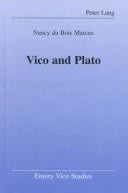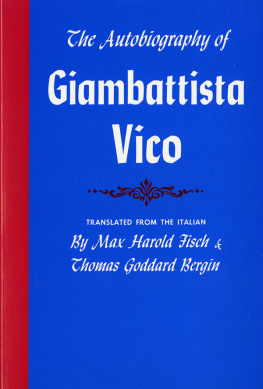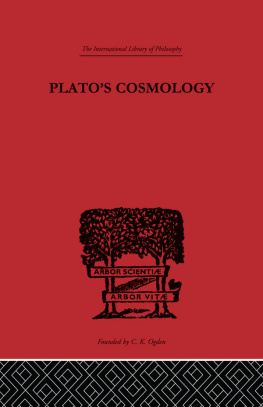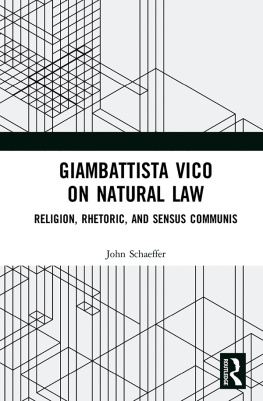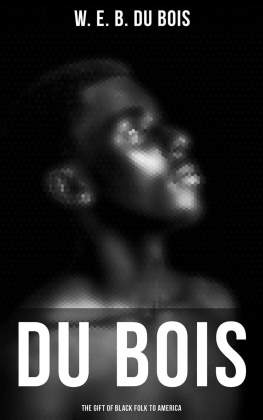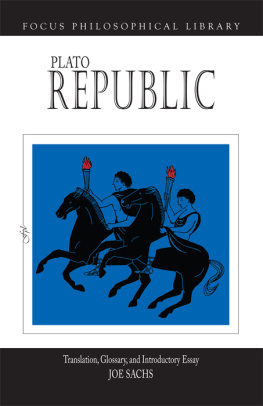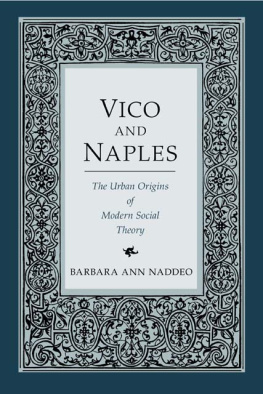Nancy du Bois Marcus - Vico and Plato
Here you can read online Nancy du Bois Marcus - Vico and Plato full text of the book (entire story) in english for free. Download pdf and epub, get meaning, cover and reviews about this ebook. year: 2001, publisher: Peter Lang, genre: Science. Description of the work, (preface) as well as reviews are available. Best literature library LitArk.com created for fans of good reading and offers a wide selection of genres:
Romance novel
Science fiction
Adventure
Detective
Science
History
Home and family
Prose
Art
Politics
Computer
Non-fiction
Religion
Business
Children
Humor
Choose a favorite category and find really read worthwhile books. Enjoy immersion in the world of imagination, feel the emotions of the characters or learn something new for yourself, make an fascinating discovery.
- Book:Vico and Plato
- Author:
- Publisher:Peter Lang
- Genre:
- Year:2001
- Rating:5 / 5
- Favourites:Add to favourites
- Your mark:
- 100
- 1
- 2
- 3
- 4
- 5
Vico and Plato: summary, description and annotation
We offer to read an annotation, description, summary or preface (depends on what the author of the book "Vico and Plato" wrote himself). If you haven't found the necessary information about the book — write in the comments, we will try to find it.
Vico and Plato — read online for free the complete book (whole text) full work
Below is the text of the book, divided by pages. System saving the place of the last page read, allows you to conveniently read the book "Vico and Plato" online for free, without having to search again every time where you left off. Put a bookmark, and you can go to the page where you finished reading at any time.
Font size:
Interval:
Bookmark:
Nancy du Bois Marcus

PETER LANG
New York Washington, D.C./Baltimore Bern
Frankfurt am Main Berlin Brussels Vienna Oxford
Library of Congress Cataloging-in-Publication Data
Marcus, Nancy du Bois.
Vico and Plato / by Nancy du Bois Marcus.
p. cm. (Emory Vico studies; v. 8)
Includes bibliographical references and index.
1. Vico, Giambattista, 1668-1744. 2. PlatoInfluence.
3. Platonists. I. Title. II. Series.
B3583 .D8 195dc21 00-056758
ISBN 0-8204-5178-9
ISSN 0883-6000
Die Deutsche Bibliothek-CIP-Einheitsaufnahme
Marcus, Nancy du Bois:
Vico and Plato / Nancy du Bois Marcus.
New York; Washington, D.C./Baltimore; Bern; Frankfurt
am Main; Berlin; Brussels; Vienna; Oxford: Lang.
(Emory Vico studies; Vol. 8)
ISBN 0-8204-5178-9
The paper in this book meets the guidelines for permanence and durability
of the Committee on Production Guidelines for Book Longevity
of the Council of Library Resources.
2001 Peter Lang Publishing, Inc., New York
All rights reserved.
Reprint or reproduction, even partially, in all forms such as microfilm,
xerography, microfiche, microcard, and offset strictly prohibited.
Printed in the United States of America
For Fred
O Plato, the soul and pupil of the eye of all the wise.
Vico, Oration II
... a metaphysics compatible with human frailty, which neither allows all truths to men, nor yet denies him all, but only some.
Vico, Ancient Wisdom
| Preface | ||
| Introduction | Vico's First Author and the Family of Plato | |
| PART I | The Dignity of Pico | |
| Introduction | Vico's Praise of the Renaissance | |
| Chapter 1 | History: Poetic Wisdom and Chronology | |
| Poetic Wisdom | ||
| Chronology | ||
| Chapter 2 | Poetry: Maker and Molder of Thyself | |
| De hominis dignitate | ||
| Born for Wisdom | ||
| Chapter 3 | Eloquence: Wisdom Speaking | |
| Pico as Eloquent Critic of Untruthful Rhetoric | ||
| Vico's Eloquence as the Flower of Wisdom | ||
| PART II | The Piety of Augustine | |
| Introduction | Vico's Particular Protector | |
| Chapter 4 | Rational Civil Theology | |
| Augustine and Varro on Types of Theology | ||
| Vico's Division of Theology | ||
| Chapter 5 | Divine Providence: Certain and True | |
| Augustinian Providence in the City of God and the New Science |
| Vichian Providence: Poetic and Philosophical | ||
| The Certainty of Poetic Providence | ||
| The Truth of Philosophical Providence | ||
| Chapter 6 | Educating the Fallen Image of God | |
| Augustinian Humility and Platonic Pride | ||
| Vico's Pious Humanism | ||
| PART III | The Philosophical Heroism of Plato | |
| Introduction | Vico's Ideal Philosopher and the Search for the True Plato | |
| Chapter 7 | Ideal Eternal History | |
| Plato's Ideal City and History | ||
| Vico's Form of History | ||
| Chapter 8 | The Serious Poet: Divine and Human | |
| Plato's Poetic Metaphysics | ||
| Vico's Frontispiece as Platonic Eikon | ||
| Chapter 9 | Conclusion: Socrates as Philosophical Hero | |
| Notes | ||
| Index |
-x-
Giambattista Vico (1668-1744) holds as an axiom of his New Science that the nature of things is nothing but their coming into being at certain times and in certain guises. Like all human things, this study of the kinship of Vico and Plato has specific origins. The importance I attach to Vico's references to Plato and Platonism arises from my conviction that philosophy must begin with Plato. The impetus to read Plato with a modern philosopher arose from my persistent sense of the incompleteness of focusing on Plato alone. My interest in Plato raised the following fundamental question: how can Plato be brought to life in philosophical conversation today?
Before discovering Vico, I immersed myself the work of Alasdair MacIntyre. I thought MacIntyre had found a way to revive the themes of ancient philosophy, especially moral philosophy, while acknowledging the history of ideas between Plato's time and our own. I defended MacIntyre from charges of historicism, but ultimately that defense unravelled. I had to accept that MacIntyre was conceding too much on the nature of truth to the modern epistemological skeptics. At this juncture, I was introduced to Vico. Providentially, MacIntyre and the Vico scholar Donald Phillip Verene had a published debate that clarified for me that Vico's project was exactly what I had sought and could not find in MacIntyre's work. I saw that Vico was the way back to the high road of Platonism for which I had been searching, and the fruit of that discovery is this work on Vico and Plato.
Investigating who Plato is for Vico both illuminates what wisdom is for Vico and provides a context for today's reader of Plato. I discovered the centrality of moderation in metaphysics as well as in moral life by studying Vico in light of Giovanni Pico della Mirandola, Augustine, and Plato. My approach is grounded in the history of Western philosophy, yet the
philosophical insights which emerged could have been discovered in other guises, as they are timeless human and moral truths. That human beings can find the ideal and eternal in the particulars of history is one of Vico's greatest insights, and his most Platonic.
The references which Vico makes to Plato and Platonism dispel the illusion that Vico is an historicist and reveal a metaphysician and a moral philosopher in the Platonic tradition. In axiom 5, Vico says to be useful to the human race, philosophy must raise and direct weak and fallen man, not rend his nature or abandon him in his corruption. Two conclusions immediately follow; first, he dismisses from the school of our Science the Stoics and Epicureans, and second, he admits to our school the political philosophers, and first of all the Platonists, who agree with all the lawgivers on these three main points: that there is divine providence, that human passions should be moderated and made into human virtues, and that human souls are immortal. Thus from this axiom are derived the three principles of this Science.
The more familiar form of these three principles is the certain form, as religion, marriage, and burial, but each of these is also proven true by the philosophers. Philosophical wisdom grows out of poetic wisdom, metaphysics from poetry, and Vico is telling us that the philosophers he chooses for this task are the Platonists. My claim is that insofar as the Vichian scientist is a philosopher, that philosophy is Platonic, as opposed to Stoic or Epicurean. As Plato's
Font size:
Interval:
Bookmark:
Similar books «Vico and Plato»
Look at similar books to Vico and Plato. We have selected literature similar in name and meaning in the hope of providing readers with more options to find new, interesting, not yet read works.
Discussion, reviews of the book Vico and Plato and just readers' own opinions. Leave your comments, write what you think about the work, its meaning or the main characters. Specify what exactly you liked and what you didn't like, and why you think so.

